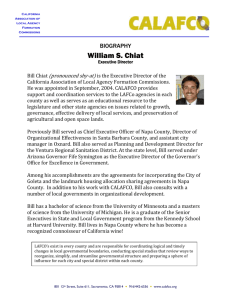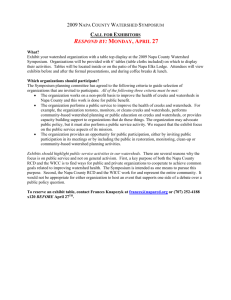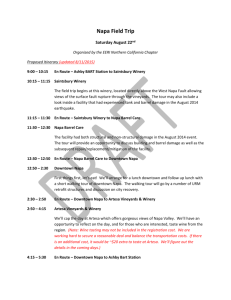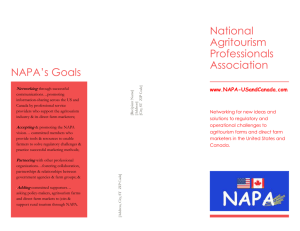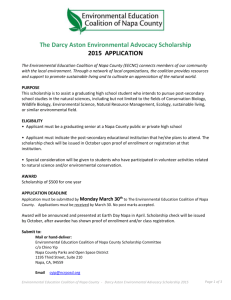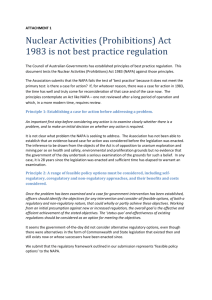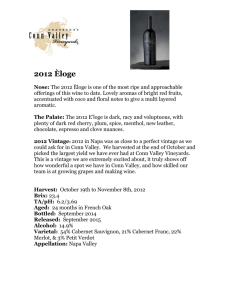November 2014 - National Association for the Practice of Anthropology
advertisement
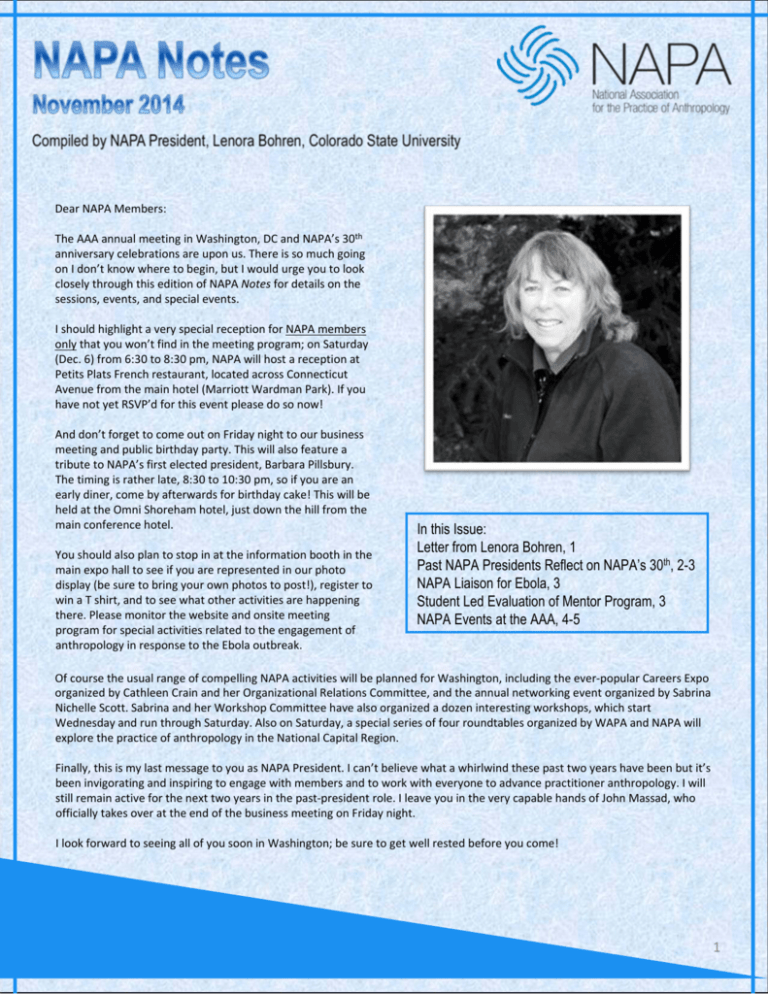
Dear NAPA Members: The AAA annual meeting in Washington, DC and NAPA’s 30th anniversary celebrations are upon us. There is so much going on I don’t know where to begin, but I would urge you to look closely through this edition of NAPA Notes for details on the sessions, events, and special events. I should highlight a very special reception for NAPA members only that you won’t find in the meeting program; on Saturday (Dec. 6) from 6:30 to 8:30 pm, NAPA will host a reception at Petits Plats French restaurant, located across Connecticut Avenue from the main hotel (Marriott Wardman Park). If you have not yet RSVP’d for this event please do so now! And don’t forget to come out on Friday night to our business meeting and public birthday party. This will also feature a tribute to NAPA’s first elected president, Barbara Pillsbury. The timing is rather late, 8:30 to 10:30 pm, so if you are an early diner, come by afterwards for birthday cake! This will be held at the Omni Shoreham hotel, just down the hill from the main conference hotel. You should also plan to stop in at the information booth in the main expo hall to see if you are represented in our photo display (be sure to bring your own photos to post!), register to win a T shirt, and to see what other activities are happening there. Please monitor the website and onsite meeting program for special activities related to the engagement of anthropology in response to the Ebola outbreak. In this Issue: Letter from Lenora Bohren, 1 Past NAPA Presidents Reflect on NAPA’s 30th, 2-3 NAPA Liaison for Ebola, 3 Student Led Evaluation of Mentor Program, 3 NAPA Events at the AAA, 4-5 Of course the usual range of compelling NAPA activities will be planned for Washington, including the ever‐popular Careers Expo organized by Cathleen Crain and her Organizational Relations Committee, and the annual networking event organized by Sabrina Nichelle Scott. Sabrina and her Workshop Committee have also organized a dozen interesting workshops, which start Wednesday and run through Saturday. Also on Saturday, a special series of four roundtables organized by WAPA and NAPA will explore the practice of anthropology in the National Capital Region. Finally, this is my last message to you as NAPA President. I can’t believe what a whirlwind these past two years have been but it’s been invigorating and inspiring to engage with members and to work with everyone to advance practitioner anthropology. I will still remain active for the next two years in the past‐president role. I leave you in the very capable hands of John Massad, who officially takes over at the end of the business meeting on Friday night. I look forward to seeing all of you soon in Washington; be sure to get well rested before you come! 1 NAPA President Baba (1986‐1988) Reflects Marietta Baba is currently Dean of the College of Social Science at Michigan State University. Dean Baba was one of the founding members of NAPA and the first President Elect, following the first elected president, Barbara Pillsbury. Dr. Baba served as president from 1986 to 1988 and was extremely involved for the first 7 years of the organization’s existence. She has been a member of NAPA ever since and feels that NAPA turning 30 is a tremendous thing to see. While she isn't as intimately involved as she once was with NAPA, she knows many of the members and thinks that they are doing great things. She has watched and followed NAPA through the years and still participates in a number of panels and various other activities. She hopes that NAPA continues to be an active part of the AAA and she would like to see it grow and become even more visible within the flagship association. She hopes that NAPA continues to reach out to anthropologists who are going into careers in practice. Compiled by Cindy Romero, Associate Editor, NAPA Notes NAPA President Van Arsdale (1998‐2000) Reflects Peter Van Arsdale currently serves as the Director of African Initiatives at the University of Denver's Josef Korbel School of International Studies, and has recently been asked to serve as the NAPA liaison for Ebola preparedness. During his time as president of NAPA Dr. Van Arsdale set four goals: increase membership, improve the identification of issue‐oriented sectors in anthropology, increase the involvement of anthropologists in policy development, and expand mentorship opportunities within the association. With NAPA turning 30 he feels that strides have been made, not only with the goals he set while president, but also in many innovative ways that he finds exciting. He is looking forward to being in D.C. for the celebration and seeing old friends. His post as NAPA liaison for Ebola preparedness, while temporary, is something that he says exemplifies the future of NAPA ‐ anthropologists reaching out and working with other organizations and agencies to help find solutions that will benefit many. “We can’t solve it all, but we can chip in. We can make a contribution.” Compiled by Cindy Romero, Associate Editor, NAPA Notes NAPA President Briody (1994‐1996) Reflects In 30 years, NAPA has evolved from a single committee within the AAA discussing non‐academic projects to an association in its own right, providing support and advocacy for a thriving side of the discipline of anthropology. The organization “was founded in 1983 to promote the practice of anthropology and the interests of practicing anthropologists, and to further the practice of anthropology as a profession.” Dr. Briody admits a deep, personal connection to NAPA, one that is part of her identity as an anthropologist. NAPA has always been, and will continue to be “on the cutting edge” of what professional anthropologists need from a professional association; however, in order to continue on, there needs to be a focus on recruitment of new and younger members, something she is energetically pursuing. Dr. Briody believes that the demographics of NAPA need to be more multi‐generational in character. She thinks that the best way to achieve this is to reach out to the master’s students through their NAPA professors, as well as to young professional anthropologists, and invite their participation in NAPA projects and activities. To paraphrase Dr. Briody, “NAPA creates opportunity; we have a unique perspective that we bring to the table. Our goal is to do no harm, but also to do some good, now and beyond.” Compiled by Trish Wright, Associate Editor, NAPA Notes Continued on page 3 NAPA Notes September 2012 2 NAPA President Liebow (2002‐2004) Reflects Continued from page 2 AAA Executive Director and former NAPA President Ed Liebow views the 30th anniversary of NAPA as a hallmark occasion, demonstrating NAPA as a well‐established organization in the larger professional anthropological world. With new visions in place, including an updated website and social media channels and unparalleled career planning services, NAPA remains well positioned to meet the changing needs of practitioners that may otherwise be unmet. Liebow highlights NAPA’s collaborative role in fulfilling AAA’s mission to increase public awareness of the important contributions that anthropology makes in both advancing human understanding and applying this understanding to tackle the world’s most pressing problems. In future directions, Liebow strongly encourages the expansion of NAPA to engagement with international chapters of anthropologists, AAA’s public education and advocacy initiatives, and organizations such as EPIC. In the past, NAPA has heavily depended on volunteers to deliver its robust range of services, which at times may be difficult to mobilize. However, through collaboration and bridge building, new members may be attracted who believe in the association’s mission and who can provide a larger volunteer base from which NAPA can draw for even greater successes in the future. Compiled by Natalie Morrissey, Associate Editor, NAPA Notes NAPA president Lenora Bohren has appointed former NAPA president and current Director of African Initiatives at the University of Denver, Peter Van Arsdale, to serve as NAPA liaison for Ebola issues. Two special sessions regarding Ebola will be held at the upcoming AAA during the afternoon of Dec. 5 and the morning of Dec. 6: further details are TBA. The roles of the AAA and the Society for Medical Anthropology are central in this regard. Informal discussions over breakfast, lunch, dinner, or coffee are being encouraged throughout the meetings. Peter welcomes comments or questions, and can be reached at either PeterVanArsdale1@gmail.com or 303‐770‐1612. A set of special, invited sessions covering Ebola issues in the context of anthropological collaboration was hosted by George Washington University on Nov. 6‐7. The open forum that immediately followed on Nov. 7 was attended by a number of social scientists, activists, and others. Meeting notes and special memoranda have been prepared from this meeting. Follow this link to see additional information and the notes mentioned above: http://practicinganthropology.org/about/annual‐meeting/annual‐meeting‐2014/napas‐ebola‐response/ NAPA has maintained a professional mentoring resource available to students and new professional anthropologists since 1990. Over the 24 years of its operation, it has provided general and individual mentoring support to hundreds of mentees. Over its history, the NAPA Mentor Program has grown and matured. Earlier this year, the committee approached Susan Squires, past NAPA President and faculty in the Department of Anthropology at the University of North Texas, to determine if there was interest in a student‐led evaluation of the Mentor Program. Currently, the NAPA Mentor Committee is working with a graduate class in the UNT Department of Anthropology to design and pilot an evaluation that will focus on six aspects of the NAPA Mentor Program. The NAPA Mentor Committee has been in close contact with Dr. Squires to review the various designs developed by graduate students in her evaluation anthropology class and to provide rapid feedback for incorporation into the specific evaluation activities. The students have submitted their proposals to UNT’s Institutional Review Board and with clearance the evaluation will go forward. The NAPA Mentor Committee is looking forward to having an independent evaluation of the program so that improvements and refinements can be developed. This is an excellent example of NAPA working with past leadership, a graduate anthropology program, and a NAPA committee to develop practical activities that engage anthropology students in NAPA activities. For more information, please contact Niel Tashima, ntashima@ltgassociates.com, Managing Partner, LTG Associates, Inc., Chair, NAPA Mentor Committee. NAPA Notes September 2012 3 NAPA/WAPA Information Booth NAPA and the Washington Association of Professional Anthropologists (WAPA) will coordinate an information booth in the main expo hall during the AAA meeting. Drop by to look at and try to identify old photos of NAPA members (and bring your own photos!); register to win a limited‐ edition NAPA T‐shirt; meet with an instant mentor; participate in the NAPA story project; and get updated on NAPA activities and opportunities. The booth will be running during the days of Thursday through Saturday, Dec. 4‐6. Be a Part! NAPA is still looking for a few volunteers to take an hour‐ long shift between Thursday and Saturday at the NAPA/WAPA information booth. It’s a great way to promote your association and see friends and colleagues. Join the many other volunteers who help NAPA function by sending your availability to booth scheduling coordinator Jason Lind at jasonlindo@gmail.com, ASAP! We also need a few more “instant mentors” to converse with meeting participants on a walk‐up basis who are interested in the practice of anthropology as a career. Let Jason know if you can serve for an hour as an instant mentor. The Sixth Annual NAPA Networking Event: Producing Connections Through Conversations You’re invited! The Sixth Annual NAPA Networking Event: Producing Connections Through Conversations will be held on Saturday, December 6, 2014 from 1:00 p.m. to 2:15 p.m. in the Marriott Ballroom Salon 2 at the Marriott Wardman Park Hotel. You’re welcome to connect with NAPA leaders, enthusiastic practitioners, applied faculty and graduate students in various career/practice areas. Please bring a friend, colleague, or fellow student with you. Thank you for making this networking event a continued success by helping producing connections through conversations in career/practice areas. Light refreshments will be served. I look forward to meeting you in DC! Sabrina Nichelle Scott NAPA Workshops Committee Chair Practice in the National Capital Region NAPA has coordinated with WAPA to create a series of special roundtables on working in the DC area. These four sessions will be held on Saturday, Dec. 6 and include working for the federal government, the private sector, in international development, and as students in the region. The roundtables will present where anthropologists work and what they do, including explorations of related and relevant topics and issues. Audience members will be expected to bring their questions and comments; at least half of each roundtable period will be open discussion. The sessions will be listed under the main title of “The Practice of Anthropology in the National Capital Region.” 9:00‐10:45 AM, Thurgood Marshall South: LIFE IN THE FEDERAL GOVERNMENT 11:00 AM‐12:45 PM, Forum Room (Omni Shoreham): PRIVATE SECTOR APPLICATIONS 2:30‐4:15 PM, Roosevelt Room 5: INTERNATIONAL DEVELOPMENT OPPORTUNITIES 2:30‐4:15 PM, Virginia Suite A: STUDENT EXPERIENCES WASHINGTON, DC December 3–7, 2014 113TH AAA Annual Meeting Producing Anthropology, the 2014 annual meeting theme, offers a provocation to examine the truths we encounter, produce and communicate through anthropological theories and methods. Follow all the NAPA‐related events via the special annual meeting web page at: http://practicinganthropology.org/about/annual‐ meeting/annual‐meeting‐2014/ Consult the meeting program for further details. NAPA Notes September 2012 4 You Can Still Register Online For NAPA Workshops at the 2014 AAA Meeting NAPA members receive discounts for registering for NAPA workshops. Register by clicking onto the link on the AAA’s main webpage at www.aaanet.org. Please consider registering and letting your colleagues, students, and fellow classmates know about the following NAPA workshops: The Personality of Conflict Resolution: A Professional Development Workshop – Katrina Patterson How to Create, Manage, and Sustain a Business in Business Anthropology – Bob Morais What's Your Elevator Pitch? – Sabrina Nichelle Scott and Elizabeth Briody Consulting in Organizational Culture and Change – Elizabeth Briody Taking An Anthropological Approach to Market Research – Maryann McCabe Mixed Method Evaluations: Qualitative or Quantitative or What? – Mary Odell Butler Getting Anthropological Work Published – Mitch Allen Working In International Health: Skills For Anthropologists – Laurie Krieger Tips and Tools for Success in Job Hunting As a New Professional Anthropologist – Cathleen Crain and Niel Tashima The Ethnographic Field School: How to Organize and Manage One – James Tim M Wallace and George Gmelch The Design Process: Thinking, Tools, Methods and Models – Christine Miller (FREE) Software for Writing and Managing Fieldnotes: FLEXDATA Notebook for PCs ‐ James Tim M Wallace and Julie Green Sabrina Nichelle Scott NAPA Workshops Committee Chair Careers Exposition For the 9th year, the National Association for the Practice of Anthropology and the AAA Office on Practicing and Applied Programs present the Careers Exposition at the AAA meeting in Washington, D.C. The Expo provides an important opportunity for students and new/emerging professional anthropologists to broaden their understanding of the important and creative opportunities for using their anthropology skills. Each year the Expo features professional and practicing anthropologists who highlight some of the creative ways that anthropologists use their skills featuring some of the many new and emerging careers paths open to professional anthropologists. Last year nearly 600 people attended the Expo including faculty interested in being able to share cutting edge opportunities with students. This year, over 30 professional anthropologists in government, private sector, and non‐profit careers will be available to discuss career development. NAPA will also have an instant mentoring booth at the Expo. The Expo runs from 11 am to 4 pm on Friday the 5th in the Exhibit Hall and is open to everyone attending the AAA. Watch for more information on NAPA and AAA LinkedIn pages, blogs, and, email blasts. Look for flyers at the meeting with the Expo map showing this year’s participants. Cathleen Crain, Managing Partner LTG Associates, Inc. NAPA Notes November 2014 Editor, Emily L. Altimare NAPA Notes September 2012 altimare@msu.edu 5
